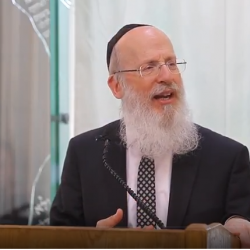
All posts in: Bechukosai
-
 7 years ago
7 years agoDouble Standards
Every valuation should be made according to the holy shekel (27:25) Although this verse is telling us the method by which a valuation was made in those times, Rav Moshe ..
Written by Rabbi Moshe Kormornick
-

-

-
 7 years ago
7 years agoWhy are the forefathers (Avos) mentioned in the wrong order?
“I will remember My covenant with Yaakov and also My covenant with Yitzchak, and also My covenant with Avraham will I remember; and I will remember the land” ..
Written by Benjamin Rose
-
7 years ago
Self-worth
Immediately after the curses (should we fail to observe the mitzvos) in our sedra we have the portion which deals with the values of people should they donate the monetary ..
Written by d fine
-
7 years ago
No Trade-Ins
The prohibition of temurah is mentioned at the very end of sedra (27:33), whereby one who donates a korban to the Mikdash is not allowed to swap it with a different ..
Written by d fine
-
7 years ago
Torah toiling
Rashi famously writes that the words in the pasuk im bechukosai telechu (26:3) refer to toiling in the study of Torah (ameilus baTorah). A central feature of learning ..
Written by d fine
-
7 years ago
Why the hekdesh values after the curses? (short)
Bechukosai basically has two parts to it: the blessings and curses, and then the portion dealing with worths and values that someone gives to the mikdash. For example, ..
Written by Anonymous
-
7 years ago
Bayis Shlishi will last FOREVER!!
The possuk says “ViNasati Mishkani Bisochachem Vlo Sigal Nafshi Eschem” “I will place my Beis HaMikdash among you, and my soul will not spit you out.” ..
Written by Benjamin A Rose
-
7 years ago
Don’t Say Hashem was Guilty of transgressing Bal Talin
“Im Bechukosai Taylaychu … ViNasati Gishmaychem B’Eto” If you will toil in Torah, Hashem promises that you will be the recipient of many Berachos ..
Written by Anonymous
-
7 years ago
that’s a funny reward?!
The reward for mitzvos is mentioned in our sedra. And instead of mentioning olam haba or the reward being HaShem giving us more opportunities to do more mitzvos, ..
Written by Anonymous


